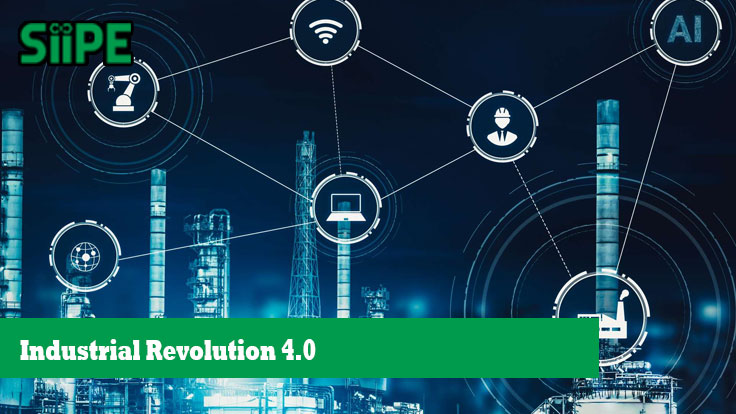Industry 4.0 is a term that refers to the fourth industrial revolution, a new era characterized by the integration of digital technology into industrial processes. This revolution brings profound changes in the way production and distribution of goods are carried out, utilizing advanced technologies such as the Internet of Things (IoT), artificial intelligence (AI), big data, and automation. This article will take an in-depth look at Industry 4.0, including what it is, how it affects various industrial sectors, and its benefits and challenges.
1. What is Industry 4.0?
Industry 4.0 refers to the digital transformation that is changing the way companies operate, produce and distribute products. The concept was first introduced in Germany as “Industrie 4.0” in 2011, and has since become the global standard for industrial innovation. At the heart of Industry 4.0 is the use of digital technologies to create more connected, intelligent and flexible production systems.
2. Main Components of Industry 4.0
Some of the key components that define Industry 4.0 include:
Internet of Things (IoT)
IoT connects machines and devices via the internet, allowing them to communicate with each other and with central systems. This enables real-time monitoring and control of production processes.
Artificial Intelligence (AI) and Machine Learning
AI and machine learning are used to analyze big data, predict failures, optimize processes, and make better automated decisions.
Big Data
The collection and analysis of large amounts of data allows companies to gain deep insights into their operations, customers, and markets.
Automation and Robotics
Automation uses robots and automated systems to increase efficiency and reduce the need for human labor in production processes.
Cyber-Physical Systems (CPS)
CPS is the integration of physical and digital systems that allows for simultaneous interaction and control of production systems.
3. Impact of Industry 4.0 on Industrial Sectors
Industry 4.0 is bringing significant changes to various industrial sectors. Here are some of its main impacts:
Manufacturing
In the manufacturing sector, Industry 4.0 enables more efficient and flexible production. With the use of robotics and automation, production processes become faster and more accurate. IoT technology enables real-time monitoring of machinery and equipment, facilitating predictive maintenance and reducing downtime.
Automotive
In the automotive industry, Industry 4.0 is contributing to the development of smart and connected cars. Technologies such as sensors and vehicle communication systems enable features such as automated parking, improved navigation, and real-time monitoring of vehicle conditions.
Energy
Industry 4.0 is also transforming the energy sector by optimizing energy production and distribution. Technologies such as smart grids enable more efficient energy management, while real-time monitoring and data analysis help in managing energy consumption and reducing waste.
Health
In the healthcare industry, Industry 4.0 technologies support the development of more sophisticated medical equipment, as well as more efficient hospital management systems. AI is used to analyze medical data and provide more accurate diagnoses.
4. Benefits of Industry 4.0
Industry 4.0 offers a variety of significant benefits to businesses and society. Some of the key benefits are:
Operational Efficiency
With automation and real-time monitoring, businesses can reduce downtime, increase production speeds, and reduce operational costs.
Flexibility and Customization
Connected and integrated production systems enable more flexible production that can be customized to specific customer needs. This allows businesses to offer a wider variety of personalized products.
Better Decision Making
Big data analytics and AI enable businesses to make more informed and strategic decisions, based on real-time and predictive data.
Quality Improvement
Advanced technologies enable better quality monitoring and early detection of problems, thereby reducing product defects and increasing customer satisfaction.
Cost Reduction
By reducing the need for manual labor, minimizing waste, and optimizing processes, businesses can reduce overall production and operational costs.
5. Challenges and Barriers
While Industry 4.0 offers many benefits, there are also a number of challenges that need to be addressed:
Initial Investment
Implementing advanced technologies requires significant investment. Many companies, especially small and medium-sized ones, may face challenges in terms of the initial costs of adopting new technologies.
Cybersecurity
With increasing connectivity and the use of big data, cybersecurity risks are also increasing. Companies must ensure that their systems are safe from cyberattacks that can disrupt operations and steal critical data.
Skills and Training
Transitioning to new technologies requires different skills. Companies must provide training to employees to be able to work with the latest technologies and get the most out of them.
System Integration
Integrating new systems with existing infrastructure can be challenging. Companies must ensure that all systems function harmoniously and effectively.
6. The Future of Industry 4.0
Looking ahead, Industry 4.0 is expected to continue to evolve and bring further changes to the industrial world. New technologies such as 5G, blockchain, and augmented reality (AR) technologies are expected to strengthen the integration and capabilities of industrial systems. By continuing to innovate and overcome challenges, Industry 4.0 has the potential to bring about a greater revolution in the way we produce, manage, and distribute goods.
A Profound And Aignificant Revolution
Industry 4.0 is a profound and significant industrial revolution that is changing the way companies operate around the world. By leveraging digital technologies such as IoT, AI, big data, and automation, Industry 4.0 offers many benefits including operational efficiency, flexibility, and better decision-making. However, challenges such as start-up costs, cybersecurity, and workforce skills must be overcome to harness the full potential of this revolution. The future of Industry 4.0 promises further innovation and new opportunities for companies and society as a whole.
Siipe the Solution to the Industrial Revolution 4.0
Siipe offers leading services in supporting digital transformation for companies adopting Industry 4.0. Our platform integrates advanced technologies such as the Internet of Things (IoT), artificial intelligence (AI), and big data to facilitate more efficient management of industrial projects and processes. With real-time monitoring, in-depth data analysis, and automation features, Siipe enables companies to increase productivity, reduce operational costs, and maximize production flexibility. We help you harness the full potential of the Industry 4.0 revolution, ensuring seamless integration and increasing competitiveness in the digital era.










